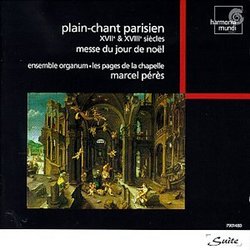Another Hit for Peres in History of Chant Collection
Patrick T. Michaels | Menlo Park, CA USA | 09/28/2000
(4 out of 5 stars)
"For some years now, Marcel Peres and the Ensemble Organum have been making available to the public at large a taste of the history of religious chant. These recordings have always been historically interesting and often, quite beautiful. This recording wins in both categories. Beautifully recorded and rendered, the music presented here transported this listener to another time and place. The music is haunting and yet quite comforting, bringing a sometimes forgotten flavor to a holiday season (Christmas) often overrun with a wearying hectic-swallow-it-fast-for-the-next-bite sort of pace. The pieces by Andre Campra (as realized by Peres) and Michel-Richard Delalande find themselves set beautifully in the context of the plainchant. This recording has been a welcome expansion of the regular Christmas repetoire. Unlike what seems to be a norm in popular music, you get your money's worth in over seventy minutes of tonal splendor."
Review (from Gramophone)
Slobberer | Astoria, NY United States | 01/26/2009
(5 out of 5 stars)
"Gregorian Chant Mass for Christmas Day. Ensemble Organum; Les Pages de la Chapelle: Maitrise du centre de musique baroque de Versailles / Marcel Peres (org). Harmonia Mundi © HMC90 1480 (72 minutes: DDD: 1/96). Texts and translations included. Recorded 1993.
This disc is a welcome addition to the growing number of chant recordings illustrating various repertoires and styles of performance over the centuries. It is not the first time that seventeenth- and eighteenth-century organ chant, alternatim has been recorded, but there cannot be many discs with a programme of pieces drawn from the old rite of Paris; a splendid rite destined, sadly, to disappear at the end of the nineteenth century. There are even fewer, if any, in which organ improvisation alternates with the chant, as is the case here, and since this form of performance would have been the norm during this period in the majority of cathedrals and churches - even in convent chapels - it is of the greatest interest to hear how it might have sounded to seventeenth- and eighteenth-century ears. It all seems to tie up extremely well: the utterly splendid Parisian chant, quite different from its Roman counterpart, provides the pieces of the Proper for Christmas Day. These are sung with appropriate ornamentation - only in two pieces, the Alleluia and the Sequence, does Peres find the temptation to introduce his customary Eastern effects too strong to resist. As for the Ordinary, Campra's magnificently tuneful 'neo-Gallican' plainchant provides the organist with the material on which to base his improvisations, and the choir a chance to prove that a slow, dignified tempo will match up to the noble versets on the eighteenth-century Cliquot organ at Houdan far better than those hurried snatches of chant one so often hears. However, there is more: the introduction of the trebles (Les Pages de la Chapelle) was an inspired stroke, especially for a Mass of Christmas. They sing with strong, confident young voices, and have no fear of sustaining long phrases of slow notes, nor of adding some conventional ornamentation of the period."


 Track Listings (15) - Disc #1
Track Listings (15) - Disc #1